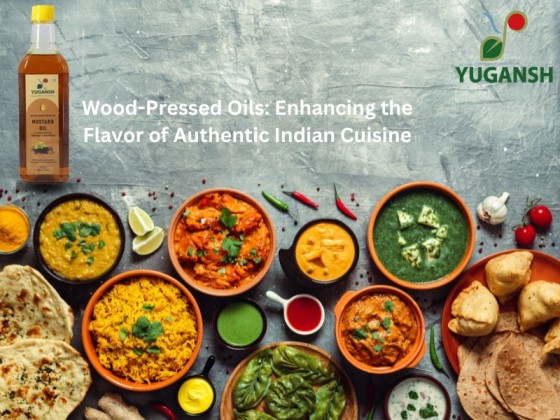Indian cuisine is known for the light of richness, interesting hues, and varied ingredients. Among all the varieties of oils used in cooking, wood-pressed oils are the most significant. Being healthy and full of unique flavours for dishes, we will discuss in this blog how wood-pressed oils enhance authentic Indian food’s flavours.
What are Wood-Pressed Oils?
Wood-pressed oils, also commonly referred to as cold-pressed oil, have been extracted by traditional methods. The process involves low-temperature pressuring that helps retain the nutrients and natural flavours within the oil. Refined oils are completely chemical-free; hence, cooking with wood-pressed oils is a healthier alternative.
Furthermore, wood-pressing implies crushing seeds or nuts with a wooden pestle. This helps ensure that the oil remains pure. Additionally, the slow process of extraction ensures the retention of the aroma and taste of the oil. Due to these reasons, these oils are widely used in Indian kitchens for preparing delicious and healthy meals.
The Role of Wood-Pressed Oils in Indian Cuisine
Indian food would not be complete without the use of oils. It is through frying, sautéing, or tempering that oil is greatly used, which brings the right flavour out from spices, vegetables, and meats. They produce authentic tastes for traditional Indian dishes.
For example, cold-pressed groundnut oil is extensively used in South Indian preparations. The oil is generally given a nutty flavour for dosa, chutney, and curries. Kachi ghani mustard oil is a staple in North and East Indian kitchens, primarily due to the pungent flavour that it carries to infuse the pickles, curries, and many kinds of stir-fries into an aromatic and flavorful taste. Wood-pressed oils do not let their natural taste be affected in any manner and make the food to be more aromatic and flavoured.
Health Benefits of Wood-Pressed Oils
Besides flavour, wood-pressed oils offer many health benefits. As they are pressed without heat, they are rich in nutrients. They also carry antioxidants, vitamins, and healthy fats that make them a much healthier oil to cook with.
Moreover, it contains no chemicals or additives that harm the body. It is healthy for the heart. It lowers the level of bad cholesterol, supports immunity, and regulates digestion. Another benefit is to the dietitian or the clean eater.
Types of Wood-Pressed Oils Used in Indian Cooking
Most Indian kitchens use a lot of wood-pressed oils. Among which some of the very common ones are as follows:
- Cold Pressed Groundnut Oil
Cold-pressed groundnut oil is very popular in South Indian food. It tastes faintly nutty and blends well with the spices of the dishes sambar and rasam. It also works well for frying and roasting.
- Kachi Ghani Mustard Oil
It has a rich flavour and an aroma but is kind of overpowering. It finds usage mostly in East Indian dishes like fish curries and pickles. That is the oil for those dishes with flavours that are spicy and tangy, bursting with savour.
- Cold Pressed Sunflower Oil
Cold-pressed sunflower oil is lighter and is usually found in most Indian cooking. It tastes light; it won’t overpower the actual dish it is being cooked for, which makes it ideal for stir-fries, salads, and shallow frying. It is also rich in vitamin E and, hence, healthy.
Cooking with Wood-Pressed Oils
The simplest thing about using wood-pressed oils is cooking. They contain a lot of flavour, so a small amount is enough to flavour your dishes. You can fry them, sauté them, or drizzle them over salads.
With a lower smoke point than refining oils, wood-pressed oils should not be used for high-heat cooking. Additionally, the storage of wood-pressed oils needs to be in a cool and dark place to retain their freshness and flavour.
Why Switch to Wood-Pressed Oils?
There are many reasons to prefer wood-pressed oils for cooking. For starters, they are healthier compared to refined oils. Refined oils contain chemicals and preservatives, which are not present in wood-pressed oils. Additionally, they are thus ideal for the long-term health aspect. The second reason is that the natural flavour obtained is retained by the wood-pressed oil, thus making the food tastier. The last but certainly not the least is that these oils happen to be environment-friendly. The age-old extraction process requires less energy and is a more sustainable process.
However, inclusion of the wood-pressed oils in your everyday food preparations makes it a little more authentic. Whether you are making a simple stir-fry or preparing a rich curry, the best flavour comes from these oils.
Conclusion
Wood-pressed oils are a twist in Indian cuisine. They not only give a unique taste but also plenty of health benefits. The Southern dishes, from the groundnut oil, which is cold pressed, to the Northern recipes, kachi ghani mustard oil, all increase the authenticity of Indian cuisine. Moreover, their nutritional value gives them a reason to be qualified as better alternatives. The introduction of wood-pressed oils in your recipes will, therefore, prepare you with perfectly tasty yet healthy dishes.


